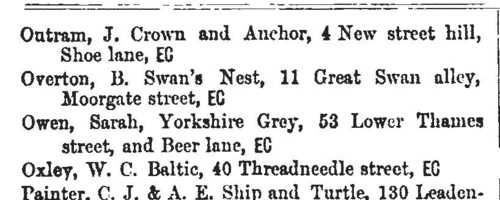Add this eBook to your basket to receive access to all 124 records. Our indexes include entries for the spelling rosewell. In the period you have requested, we have the following 124 records (displaying 101 to 110): These sample scans are from the original record. You will get scans of the full pages or articles where the surname you searched for has been found. Your web browser may prevent the sample windows from opening; in this case please change your browser settings to allow pop-up windows from this site.  British infantry fighting in China
(1860) British infantry fighting in China
(1860)
The China Medal was awarded to soldiers and sailors who took part in the prosecution of the war against the Chinese from 1856 to 1860. Separate clasps were awarded for men who had been in receipt of the China Medal of 1842; for being actually present at Canton on 28 and 29 December 1857, when that city was bombarded and finally captured; for being actually engaged in the operations which ceased with the first capture of the Taku Forts, 20 May 1858, and led to the Treaty of Tientsin; for being actually present at the capture of the Taku Forts 21 August 1860; and for being actually present before Pekin the day the gate of that city was given up to the allied (British and French) army, viz. on 13 October 1860. The 1st battalion, the 3rd (East Kent) Regiment of Foot (the Buffs), based in Limerick, embarked for Malta 2 April 1851. The battalion took part on in the capture of the Taku Forts. | Sample scan, click to enlarge

| Long-stay Paupers in Workhouses: Chertsey
(1861)
This comprehensive return by the Poor Law Board for England and Wales in July 1861 revealed that of the 67,800 paupers aged 16 or over, exclusive of vagrants, then in the Board's workhouses, 14,216 (6,569 men, 7,647 women) had been inmates for a continuous period of five years and upwards. The return lists all these long-stay inmates from each of the 626 workhouses that had been existence for five years and more, giving full name; the amount of time that each had been in the workhouse (years and months); the reason assigned why the pauper in each case was unable to sustain himself or herself; and whether or not the pauper had been brought up in a district or workhouse school (very few had). The commonest reasons given for this long stay in the workhouse were: old age and infirm (3,331); infirm (2,565); idiot (1,565); weak mind (1,026); imbecile (997); and illness (493). | Sample scan, click to enlarge

| Long-stay Paupers in Workhouses: Staines
(1861)
This comprehensive return by the Poor Law Board for England and Wales in July 1861 revealed that of the 67,800 paupers aged 16 or over, exclusive of vagrants, then in the Board's workhouses, 14,216 (6,569 men, 7,647 women) had been inmates for a continuous period of five years and upwards. The return lists all these long-stay inmates from each of the 626 workhouses that had been existence for five years and more, giving full name; the amount of time that each had been in the workhouse (years and months); the reason assigned why the pauper in each case was unable to sustain himself or herself; and whether or not the pauper had been brought up in a district or workhouse school (very few had). The commonest reasons given for this long stay in the workhouse were: old age and infirm (3,331); infirm (2,565); idiot (1,565); weak mind (1,026); imbecile (997); and illness (493). | Sample scan, click to enlarge

| Innkeepers and Publicans in London north of the Thames
(1874)
Henry Downes Miles compiled this London and Suburban Licensed Victuallers', Hotel and Tavern Keepers' Directory, which also had sections listings brewers, maltsters, hop factors, distillers and rectifiers of the United Kingdom. | Sample scan, click to enlarge

| English Pupil Teachers training to become Schoolmistresses
(1877)
The Education Department set examinations for candidates for admission into training colleges, and to become teachers. This is the class list (in order of merit) of the pupil teachers who passed that examination at Christmas 1877. The list gives the candidate's name (surname first) (prefixed by an asterisk where she was examined on second-year papers), and the school in which engaged (N. for National School, Ch. Church of England, B. British School, W. Wesleyan, R. Roman Catholic, P. Parochial, Bd. Board School, Indl. Industrial School). | Sample scan, click to enlarge

| Debtors
(1880)
County Court Judgments in England and Wales | Sample scan, click to enlarge

| Debtors, Insolvents and Bankrupts
(1880)
Bills of sale (binding assets to a creditor/lender), insolvencies and bankruptcies in England and Wales, July to September 1880 | Sample scan, click to enlarge

| Debtors, Insolvents and Bankrupts
(1880)
Bills of sale (binding assets to a creditor/lender), insolvencies and bankruptcies in England and Wales, April to June 1880 | Sample scan, click to enlarge

| Debtors, Insolvents and Bankrupts
(1881)
Bills of sale (binding assets to a creditor/lender), insolvencies and bankruptcies in England and Wales, October to December 1881 | Sample scan, click to enlarge

| Debtors, Insolvents and Bankrupts
(1882)
Bills of sale (binding assets to a creditor/lender), insolvencies and bankruptcies in England and Wales, April to June 1882 | Sample scan, click to enlarge

|
Research your ancestry, family history, genealogy and one-name study by direct access to original records and archives indexed by surname.
|












